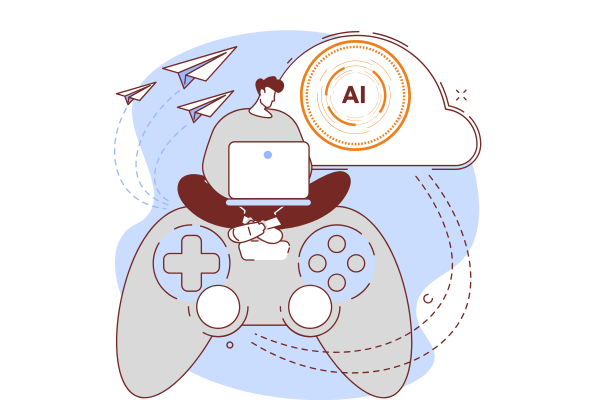Unleashing the AI Revolution: Gaming
Category: AI Revolution
Introduction:
The gaming industry is undergoing an extraordinary evolution, with artificial intelligence (AI) significantly influencing the creation of immersive experiences. AI has changed how games are developed and experienced, from designing smart non-player characters (NPCs) to generating dynamic game environments through procedural content.
How AI Enhances (Non-Player Characters) NPCs:
Non-player characters have evolved significantly from their once static and predictable actions in earlier video games. Nowadays, NPCs driven by artificial intelligence demonstrate an intelligence level that can compete with human players. Here's an overview of how:
Dynamic Behavior: Contemporary AI algorithms allow non-player characters (NPCs) to adjust in response to player moves. They are capable of learning, formulating strategies, and making decisions on the fly, enhancing the challenge and enjoyment of the gameplay.
2. Realistic Interactions: NPCs powered by AI can engage players in significant dialogues through natural language processing (NLP). Titles such as The Elder Scrolls V: Skyrim demonstrate NPCs that respond to player decisions, enhancing the feeling of immersion.
3. Complex Decision-Making: Machine learning models enable NPCs to evaluate multiple factors and react appropriately. For example, in strategy games, AI competitors can use sophisticated strategies to outsmart players.
Procedural Content Generation: Redefining Game Worlds: Procedural content generation (PCG) employs AI algorithms to dynamically produce game assets, levels, and environments. This method has transformed game development in multiple ways:
1. Endless Possibilities: Procedural Content Generation (PCG) enables developers to create extensive and distinctive game environments without the need to individually craft every aspect. Titles such as Minecraft and No Man's Sky exemplify this, providing endless possibilities for exploration.
2. Cost and Time Efficiency: By streamlining content generation, PCG greatly lowers both development time and expenses, allowing studios to concentrate on improving gameplay features and narratives.
3. Personalized Experiences: Artificial intelligence can customize content to suit the unique preferences of each player. For example, elements such as difficulty settings or environmental themes can be modified according to the player's actions and skill level.
AI Game Design: The Future of Creativity:
Artificial intelligence is not just improving the gaming experience but is also supporting developers in their creative endeavours. AI-driven tools can help in:
1. Storytelling: AI algorithms can generate narrative arcs and dialogues, providing game writers with fresh ideas and perspectives.
2. Character Development: By utilizing AI, designers can craft realistic characters that possess unique personalities and backgrounds, enhancing the overall gaming experience.
3. Testing and Optimization: Artificial intelligence can model countless gameplay situations to detect glitches and improve mechanics, guaranteeing a refined end product.
Conclusion:
The incorporation of AI in gaming signifies a groundbreaking shift in innovation and creativity. By allowing for more intelligent NPCs and utilizing procedural content generation, AI is enhancing the gaming experience for players around the globe. As technology progresses, the limits of what can be achieved in gaming will continue to grow, providing players with increasingly immersive and tailored experiences.
